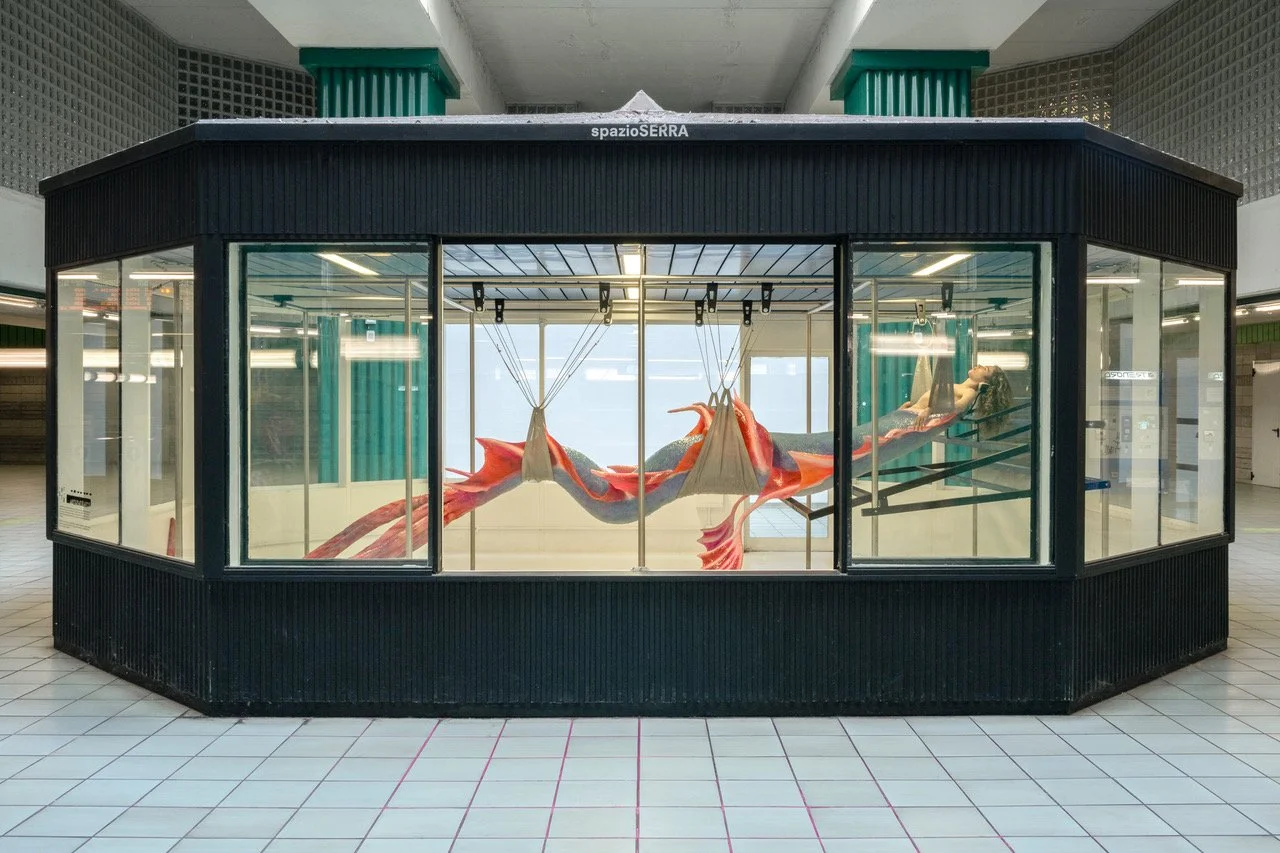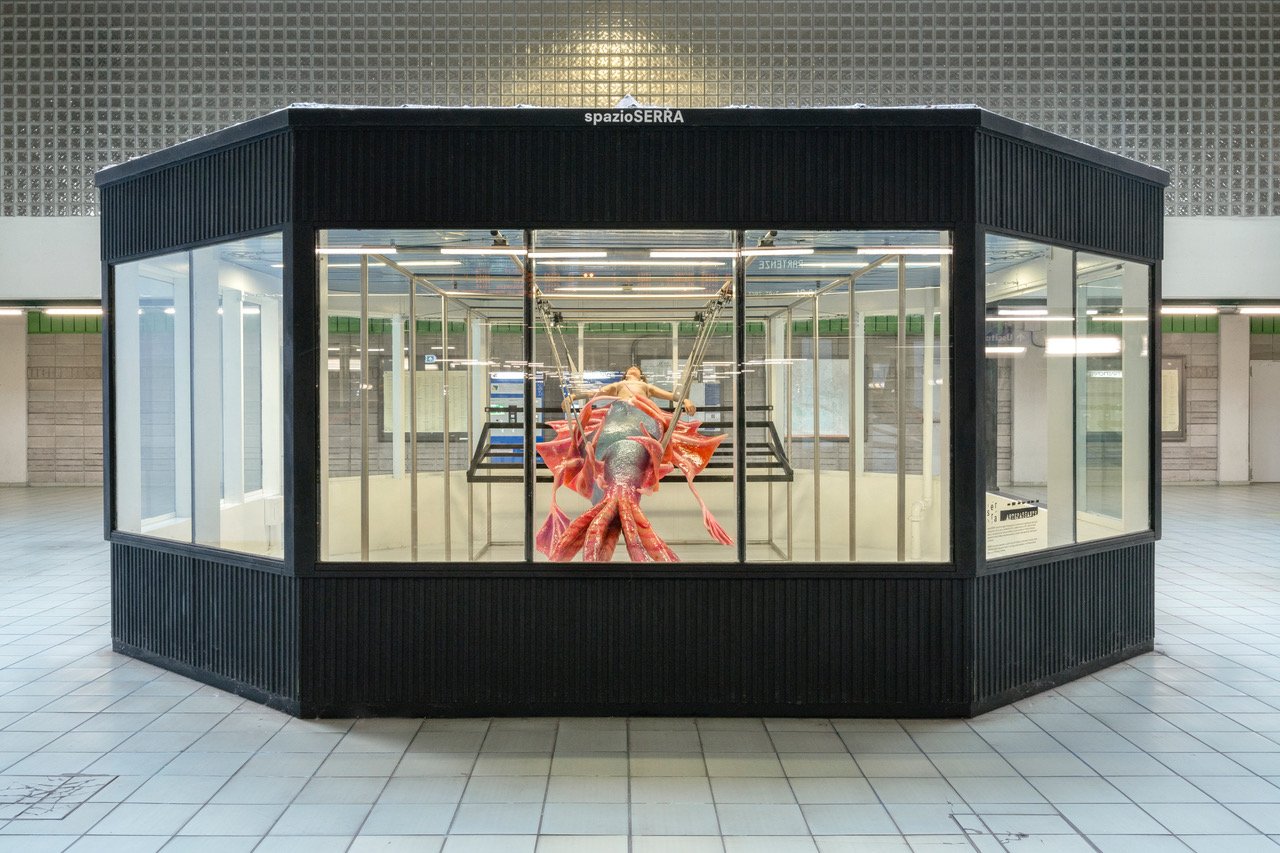Agnes Questionmark
Known for her extreme performances and eclectic marine sculptures, the multifaceted Agnes Questionmark has become one of our time’s most exciting and shapeshifting artists. While pursuing an MFA at the Pratt Institute in New York, for which she has been awarded a Merit Scholarship, Agnes is currently exhibiting her latest long durational performance, "CHM13hTERT," started on May 4 and closing on May 19, at SpazioSERRA in Milan.The project intends to extend the notion of a 'human being' into a hybrid, unidentifiable creature, presenting the artist herself as a questionable genesis yet to be defined.
“Systems are a means for control. When oppressive structures are put into question, the solid convictions that act as the foundation for religious and political ideologies begin to collapse. Western science, like education and art, is a tool of control, a way of protecting and defending a systematic structure. It is easier to believe than not to believe, easier to be convinced, to rest your feet on the ground put beneath you rather than existing with uncertainty or fear” - Agnes Questionmark
You are on a quest to speculate and bring curiosity to human endurance against the changing environment. Please talk about the relationship of transcendence with suffering as an artist. What is your relationship with the viewer? What is the importance of emotional tolerance him your work?
Through endurance, I can transcend myself. Through repetition, pain and suffering, my mind and body engage in an altered state of being. It doesn’t feel human, at least not how we are taught to think of humanness. It is through suffering that I distance myself from who I am. It’s a resistance against my nature and my body, probably because I have never understood satisfaction with my physical form. Often my performances reach a moment of such depletion, exhaustion, and emptiness, that I gain a new psychological control and even a new capacity. I’ve dug to the bottom of myself and found another world there.
Because of the magnitude, the often theatrical and dramatic allure of my performative installations, the viewer is forced to question their power relation and agency towards my work and my body. Although the forms I take on may seem foreign to my audiences, and my experience vulnerable, I am in complete control of what I do and the choices I make. I hope that by forcing viewers to witness something shocking and “abnormal”, I shake their conception of what is ‘natural’ and by extension what should be considered ‘human’. In this moment of revelation, of questioning, the viewer is the one who loses control of their mind, their impulses and their confined way of thinking. In allowing them to behold my body in this way, I allow them to question their bodies and their own internal and external fluidity.
You remind me of Prairie Johnon’s character from the Sci-fi series of ‘The OA’ starred by Brit Marling who can tap into parallel realities and multiple dimensions with signature dance moves and performing arts. What is your relationship with performance growing up in Rome? Please take us through your early progressing years when you began understanding yourself and your work.
I have never watched ‘The OA’. Your mention of multiple dimensions reminded me of Octavia Butler’s Xenogenesis and ‘Planet of No Return’ by sci-fi writer Poul Anderson. In these fictional stories, there are opposing representations of colonialism and the human desire to control evolution. In Butler’s story, humans are under the control of an extremely sophisticated and genetically modified species that is studying and controlling humans to feed from them to thrive and survive. In Anderson’s story, a group of white men pursue space travel in the hopes of conquering a new planet but instead find themselves at the mercy of a treacherous planet and the unknown forces which inhabit it.
Although these novels are largely different, I found both stories to be interesting, critical take on the stubborn conquest for human improvement and the acquisition of immortality. I recently watched ‘Altered States (1980) in which I found many similarities to the composition and aesthetic of my work. I also enjoy watching and rewatching Cronenberg movies and Matthew Barney’s series when I can find them online. Someone once said that I am a bad copy of Barney. Well, I found that awesome. I am indeed writing and composing my mythology. I am the narrator and the actor, the doctor and the patient. I choose to use my body as a test subject for my experiments. I live my science fiction, empowered by a new name, identity and rewritten biology. Some days I feel like I am in complete control of my existence and then in the next moment, I realize that I, like those men from Anderson’s story, am at the mercy of the unknown, searching to achieve something unattainable, to have something that does not exist.
Transgenesis is no more science fiction when we all are aware of the existence of transfigured bodies. Society has rigid definitions. I wonder about your intentions behind the redefinition of this structure. What do you think are the reasons that people choose to remain oblivious and ignorant of larger contexts that exist outside their realities?
Systems are a means of control. When oppressive structures are put into question, the solid convictions that act as the foundation for religious and political ideologies begin to collapse. Western science, like education and art, is a tool of control, a way of protecting and defending a systematic structure. It is easier to believe than not to believe, easier to be convinced, to rest your feet on the ground put beneath you rather than existing with uncertainty or fear. When the leash is removed and the control is in the hand of the individual, the danger of collapse looms nearer. In gaining agency of your own identity—both physical and emotional—through scientific and biological evolution, you create your own experience, abstracted from what is globally validated, and revolt against the forces which control you.
Pursuing your independent thought and authentic self-realization is the most powerful and rebellious act.
The sea creatures and the underwater world have influenced you significantly. It has also great cultural and mythological relevance. Agnes, what's your relationship with the sea and the symbolism it carries?
My father was a sailor, I grew up on the sea. I started diving when I was very young and got acquainted with marine life with ease and comfort. To me being a fish was normal. I often imagined talking to them, following them and being part of their underwater worlds. Transpecies-ism and connection with other creatures were a part of my childhood. The body changes underwater, your heart rate slows, your circulation focuses on your vital organs and your lungs shrink. At the physical level, you transform into something else, but also psychologically and unconsciously. From one breath to the next the body passes through different stages, forced to reject a survival impulse, allowing vulnerability and precariousness to take over. Even though humans can adjust to watery conditions, the sea is understood to be a hostile place. To me, the importance of performing underwater is to reveal human’s controversial relationship with the sea - the notion of never-ending gestation, growth, and evolution contrasted by the inevitable decay of our bodies.
Please take us through the conceptualization and direction of your work. What is your workflow? What is it that guides you in the direction of what you want to do? What kind of challenges have you gone through? Is there anything you seek from your performances?
My research has always guided my work. As soon as I started reading about the potential of the sea as a transformative tool for humanity (through the brilliant minds of hydro-feminist Neimanis or Irigaray or Haraway and Morthon among others) my work took a very liquid direction. I began to obsess over the generation and recreation of habitats that would put our current experience on this planet into question, proposing alternative pathways of escape from the normative realities we live in.
However, as soon as I started transitioning I gained a new conception of myself, and a more scientific understanding of my body, its inner processes and its relationship with the world around me. Suddenly, biology as well as genetic engineering became an incomprehensible necessity to me. This of course had a significant impact on my areas of interest and thus the things I chose to research as well as the direction of my work, which became more critical, exacting and based on science.
I started to explore other territories, other materials and approaches to my work. My studio in New York feels and looks like a scientific laboratory. I can sense that sometimes, even my peers are scared to enter. They tell me it looks like a virus or infestation is about to burst from my studio. If in Transgenesis the importance of the connection with the sea and my embrace of fluidity was the focal point, in my upcoming project CHM13hTERT the focus is shifted to the potentiality of genetic engineering as an act of liberation from the human being and rebellion against human systems of oppression.
How do you experience yourself when you undergo all these transformative characters and radical acts? What emotions and mental space do you anchor down during your performances?
When I was performing Transgenesis in London, I felt like a giant octopus. When I am underwater performing inside an aquarium, I feel as if I am a fetus in the womb or a creature in a cage. As challenging as it is for my body, it is equally difficult and disorienting for my mind. I fight to reach a state of transcendence and alienation but I also notice myself needing to hold on to something, a thought, a rationale, to avoid a state of panic.
For Transgenesis I performed 8 hours per day, every day for 23 consecutive days. My body was quickly in a state of pain due to my standing posture, the constant labours of my arms and my intense breathing and vocalizing. Physical and mental exhaustion were adversaries I had to overcome. And to do so I harnessed my imagination to distract my consciousness, entering into another world. In many ways, it was a torture I had not expected and from which I sometimes begged to be free. But I had no other choice. Every day, after finishing the performance I had to go back home and prepare to wake up the following day to start over. For the whole duration of the show, I had to stay focused. My life during those days changed. It was not me. I was the octopus. My understanding of time changed.
The sound piece is what guided me and gave me a tempo. I calculated the passing time by counting the repeating loop of the audio piece. It was a 15-minute piece and I knew that it had to play 36 times. After the performance, 15 minutes became an instant when compared to my time in the octopus. When someone would tell me I had to wait 1 hour, it was nothing for me, just 4 songs. I had a post-traumatic experience connected to the audio after the performance. I refused to watch the performance video or listen to the audio for many months after my performance as it triggered me and I would face the pain again. However, that pain was necessary for me to destroy a part of myself that I needed to let go of to embrace a new one.
Last but not least, Please tell us a bit about your ongoing exhibition "CHM13hTERT" happening at SpazioSERRA in Milan. How would you describe this experience of yours? What are you expecting out of this performance?
For my CHM13hTERT performance, I decided to challenge myself again by creating a new creature whose characteristics and morphologies are unrecognizable. The creature will be suspended in a metal structure that functions as a nursery room or operating table. The creature is resting or waiting in the middle of a train station in Milan. I decided to perform from 8 am to 8 pm to establish a connection with commuters who start their day in the early morning and come back in the evening. I decided to stay there for 12 hours to present an image and experience that will last in the audience's mind even when they are not there. For me, it will be an elevated challenge in resistance and concentration. I will be constrained and trapped, experiencing private and unknowable suffering, but also liberated from any human form.
interview JAGRATI MAHAVER
What to read next













